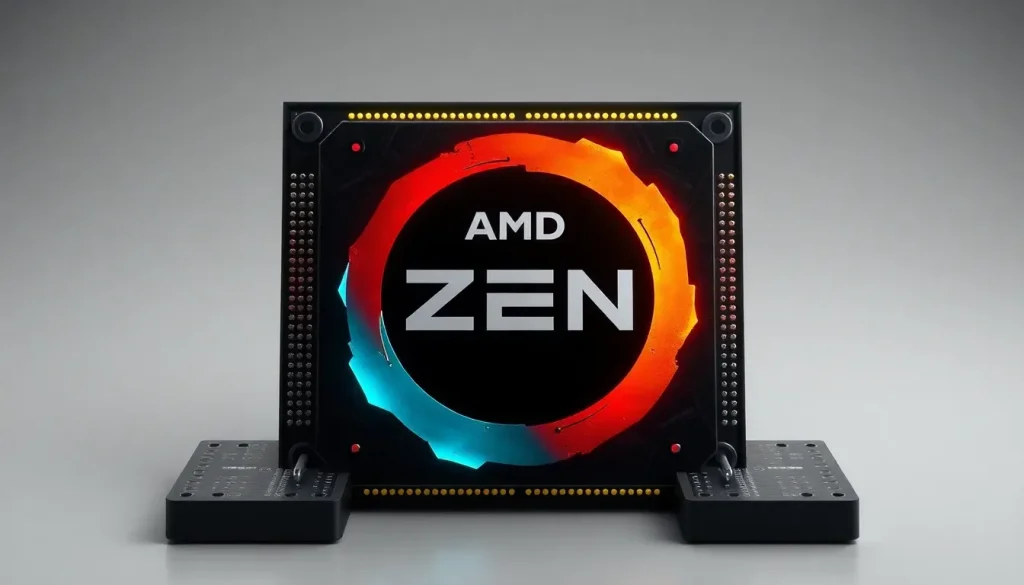AMD Zen 7 CPUs to Feature 32 Cores and 448MB Cache

In the ever-evolving landscape of computing, AMD continues to push boundaries with its innovative CPU designs. The upcoming Zen 7 architecture is generating considerable buzz in the tech community, with expectations of unprecedented performance capabilities. With features like up to 32 cores and a staggering 448MB of cache, AMD is positioning itself to redefine high-performance computing.
This article delves into the anticipated specifications and capabilities of the Zen 7 CPUs, exploring everything from core architecture to potential release timelines, and what users can expect from this next-generation technology.
- Overview of AMD Zen 7 CPUs
- Core Architecture: A Deep Dive into CCD Designs
- Cache Management: A Game Changer
- Manufacturing Process: TSMC's Cutting-Edge Technology
- Performance Expectations: A Significant Leap Forward
- The Epyc Series: Unprecedented Core Counts for Servers
- Anticipated Release Timeline and Market Impact
- Conclusion: The Future of AMD CPUs
Overview of AMD Zen 7 CPUs
AMD's Ryzen Zen 7 CPUs are set to revolutionize the market with their groundbreaking architecture. Reports indicate that these chips will feature a new CCD (Core Complex Die) design, allowing for a remarkable increase in core count and cache size compared to their predecessors. This innovation is expected to not only improve multi-threaded performance but also enhance single-threaded applications significantly.
Core Architecture: A Deep Dive into CCD Designs
The new Zen 7 architecture will leverage two distinct CCD designs: one with eight cores and another boasting an impressive 16 cores. This flexibility allows AMD to cater to various market segments, from budget-conscious consumers to high-end enthusiasts.
- 8-Core CCDs: Targeted primarily at entry-level models, these chiplets will maintain a compact size and offer substantial performance for everyday tasks.
- 16-Core CCDs: Exclusively available in premium models, these larger chiplets are designed for users seeking top-tier performance in demanding applications.
According to leaker Moore’s Law Is Dead (MLID), these innovations are backed by insights from multiple sources within AMD, indicating a solid foundation for these claims.
Cache Management: A Game Changer
One of the standout features of the Zen 7 architecture is its impressive cache size. The design reportedly includes:
- 2MB of L2 cache per core
- 8MB of L3 cache per core
- Up to 32MB of L2 per CCD
- 64MB of L3 cache per CCD
- A potential total of 448MB of L3 cache for the CPU, combining on-die cache with additional layers.
This substantial cache size is expected to result in significant performance improvements, particularly in cache-sensitive applications.
Manufacturing Process: TSMC's Cutting-Edge Technology
The Zen 7 CPUs will be manufactured using TSMC’s advanced 5nm and 6nm processes. This not only allows for higher density and efficiency but also ensures that AMD can fit these robust designs into a manageable footprint.
Key manufacturing details include:
- A14 Node: Used for the core designs, providing enhanced performance and energy efficiency.
- 6nm Process: Employed for the I/O die, ensuring that communication between cores and other components is optimized.
Performance Expectations: A Significant Leap Forward
Performance metrics for the Zen 7 CPUs are looking promising. MLID estimates a potential increase in instructions per clock (IPC) of:
- 15-25% in single-threaded applications
- 50-67% in multi-threaded workloads
This performance leap can be attributed to a variety of factors, including:
- Increased core count
- Advanced cache architecture
- Improved IPC performance due to architectural enhancements
Compared to the previous generation, Zen 7 could deliver more than 50% improvement in single-threaded tasks and up to 150% faster performance in multi-threaded scenarios.
The Epyc Series: Unprecedented Core Counts for Servers
A notable mention from the Zen 7 lineup is the anticipated Epyc “Steamboat” CPU, which is rumored to feature a staggering 264 cores and an astounding 2,122MB of L3 cache, utilizing a new V-Cache stacking technique. This is a significant upgrade from the Genoa-X Epyc series, which maxed out at 1,152MB of L3 cache.
While the dual-stacked V-Cache previously rumored may not be featured in Zen 7, the sheer scale of performance expected from these processors is likely to set new benchmarks in the server market.
Anticipated Release Timeline and Market Impact
As per MLID's insights, the Zen 7 Epyc CPUs could launch as early as the first half of 2028, followed by desktop and laptop models later in the year. This rapid release cycle reflects AMD's aggressive strategy to maintain its competitive edge in the CPU market.
With the potential delay of Zen 6 to early 2027, AMD's timeline for releasing Zen 7 may seem ambitious but could provide a much-needed boost in performance for users awaiting new hardware.
Conclusion: The Future of AMD CPUs
The AMD Zen 7 CPUs promise to be a monumental step forward in computing power. With a combination of innovative core designs, massive cache sizes, and cutting-edge manufacturing techniques, these processors are set to redefine performance standards across various applications, from gaming to professional workloads.
For those who want to stay updated with the latest information on AMD's Zen 7 CPUs, consider following the developments on platforms like Google News.
Additionally, check out this insightful video that summarizes the latest leaks and expectations surrounding the AMD Zen 7 CPUs:




Leave a Reply